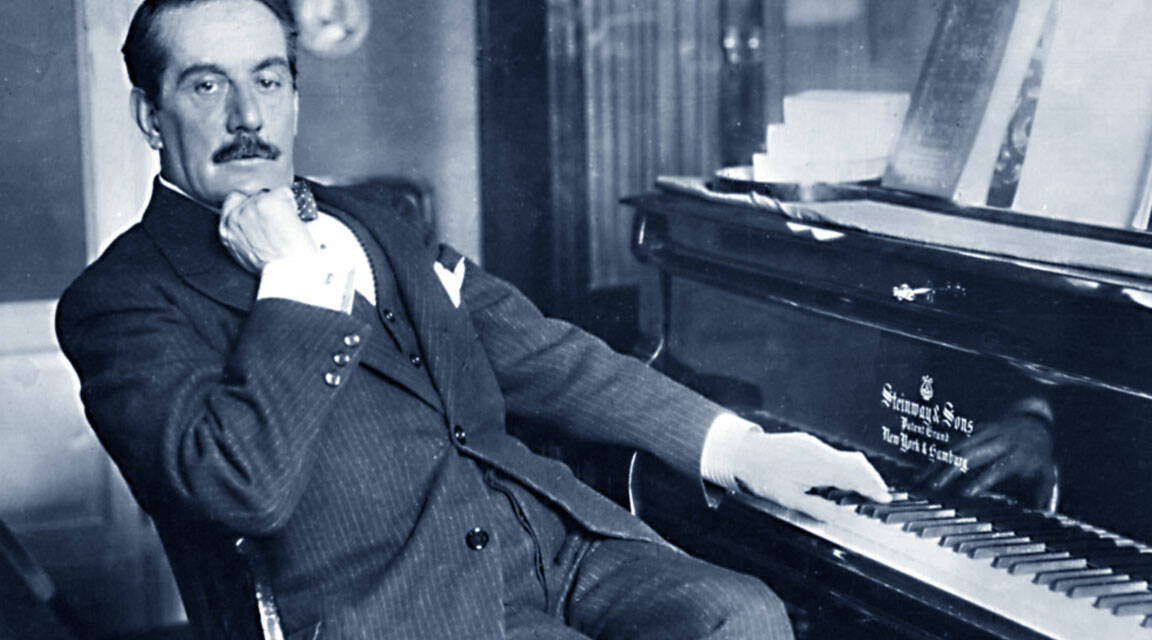Name: Giacomo Puccini
Born: 22 December 1858
Died: 29 November 1924
Place of birth: Lucca, Italy
Known for: one of the greatest and most successful proponents of Italian opera, with a host of well-known hits to his name.
Career
Coming from a long line of musicians and composers, Puccini was expected to follow in his ancestors’ footsteps. He was church organist at the age of 14 and was already composing his first pieces, but it was seeing a performance of Giuseppe Verdi’s Aida (1871) in Pisa in 1876 which sealed his future in opera.
The composer was the leading exponent of the genre of opera known as ‘verismo’ – Italian for ‘realism’. The style is characterised by a story derived from real life, rather than tales about the gods or mythology.
Puccini’s first opera was the one-act Le Villi (The Fairies), written in 1883 for a local competition sponsored by the Sozogno music publishing company. The work didn’t win, but a small group of admirers funded its premiere at the Teatro dal Verme in Milan in May 1884. It turned out to be a critical and commercial success and caught the attention of the music publisher Giulio Ricordi.
This proved crucial to Puccini’s professional life. Ricordi carefully managed the composer’s career, advising him on possible subjects, finding librettists and smoothing over any creative differences. Ricordi commissioned Puccini to compose a new opera for La Scala. Performed there in 1889, Edgar was an utter failure. But Ricordi remained faithful to his protégé.
The publisher’s belief paid off. Puccini’s third work, Manon Lescaut (1893), was a great success and established its writer’s reputation as the most promising rising composer of his generation. It also marked the start of a lucrative collaboration with librettists Giuseppe Giacosa and Luigi Illica. The pair returned for Puccini’s next three operas, probably his greatest successes: La bohème (The Bohemians, 1896), Tosca (1900) and Madama Butterfly (1904).
Giacosa died in 1906 and Puccini struggled to find new subjects and collaborators. However, he continued to create impressive works, with dramatic Wild West opera La fanciulla del West (The Girl of the West, 1910), the tender lyric comedy La rondine (The Swallow, 1917) and Il trittico (The Triptych, 1918). This last was an ambitious series of three one-act operas comprising Il tabarro (The Cloak), Suor Angelica (Sister Angelica) and Gianni Schicchi, each concerning the concealment of a death.
Puccini’s final opera was left unfinished at the composer’s death in November 1924. The last two scenes of Turandot were completed by Italian composer and pianist Franco Alfano based on Puccini’s own sketches. The opera contains a number of memorable stand-alone arias, among them ‘Nessun dorma’. It premiered at the Teatro alla Scala in Milan on 25 April 1926.
Personal life
Giacomo Antonio Domenico Michele Secondo Maria Puccini was born in the Italian city of Lucca in 1858. He was the sixth of nine children of Michele Puccini (1813-1864) and Albina Magi (1830-1884). He was born into something of a musical dynasty: starting with Puccini’s great-great grandfather, also called Giacomo, the position of maestro di cappella (musical director) of the Cattedrale di San Martino was passed from father to son for two centuries.
The young Puccini was expected to succeed his own father in the role. However, Michele Puccini died in 1864 when his son was only six years old. The municipality of Lucca supported the family with a small pension and kept the position of cathedral organist open for Giacomo until he came of age.
He studied music with two of his father’s former pupils, and later under his uncle Fortunato Magi, receiving a diploma from the Pacini School of Music in Lucca in 1880. He continued his musical education at the Milan Conservatory, studying composition. He graduated on 16 July 1883.
In 1884 Puccini started an affair with Elvira Gemignani, a former piano student of his. The couple fled Lucca when Elvira became pregnant; a son, Antonio, was born in Monza in 1886. Elvira was also escaping an unhappy marriage – her husband Narciso Gemignani was an inveterate philanderer who was eventually killed by the husband of a woman with whom he was having an affair. With Gemignani’s death, Puccini and Elivira were free to marry.
It was not a successful move for Elvira, as Puccini also had a string of illicit relationships. In 1909, Elvira publicly accused Doria Manfredi, a maid working for the Puccini family, of having an affair with the composer. The girl was driven to suicide and her family had her examined by a doctor, who declared her a virgin. The Manfredis brought charges against Elvira for persecution and slander. She was found guilty, but avoided a five-month prison sentence when Puccini paid damages to the family.
A heavy smoker of both cigars and cigarettes, Puccini was diagnosed with throat cancer in 1923, having suffered a series of chronic sore throats. Doctors recommended a new and experimental radiation therapy treatment. Puccini died in Brussels on 29 November 1924, aged 65, from complications after the treatment; uncontrolled bleeding led to a heart attack the day after surgery. He died with the incomplete score of Turandot in his hands.
Did you know?
La bohème premiered in Turin in 1896, conducted by Arturo Toscanini, one of the most acclaimed and influential musicians of the late 19th and early 20th centuries; 50 years later, Toscanini conducted a commemorative performance of the opera on radio with the NBC Symphony Orchestra.
Best-known works
Puccini composed four of the most popular operas of all time: La bohème, Tosca, Madama Butterfly and Turandot. Of these, the first is often considered his greatest. Music scholar Julian Budden wrote of it: “Had Puccini written nothing else after La bohème, his permanent niche in the operatic repertory would have been assured.”
Image
Composer Giacomo Puccini at his piano in 1900 (via Wikimedia Commons).

